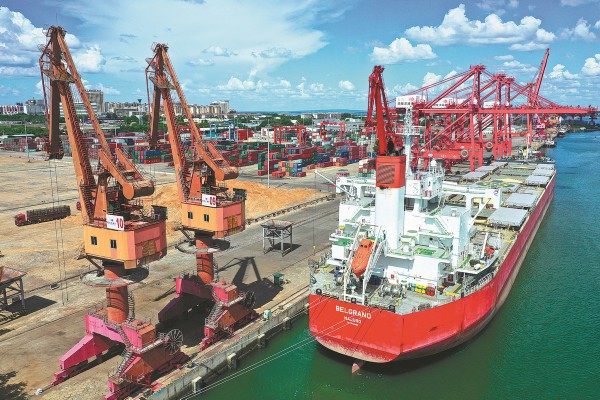
A ship carrying soybeans from Brazil arrives at a port in Haikou, Hainan province, in July. GUO CHENG/XINHUA
Yuan used increasingly in preference to US currency for trade settlements
Economies across the world are exploring the use of convenient currencies other than the United States dollar for trading.
Analysts believe that China and other countries are gradually reducing their dependence on the dollar by using local currencies for cross-border trade, helping to create a multipolar international currency system.
At the end of March, the Shanghai Petroleum and Natural Gas Exchange, or SHPGX, reported that China had imported liquefied natural gas from the United Arab Emirates using cross-border yuan settlement.
It was the first time that China — the world's second-biggest importer of LNG — had used its currency for such a purchase, as the global commodities trade has long been based on US dollar-denominated transactions.

A visitor and an exhibitor negotiate business deals at the Clocks, Watches &Optical Instruments exhibition section of the second phase of Canton Fair in Guangzhou of Guangdong province, April 23, 2023. [Photo/Xinhua]
Sergio Rossi, a professor of macroeconomics and monetary economics at the University of Fribourg in Switzerland, said the LNG deal with the UAE showed that oil exporting countries are keen on using currencies such as the yuan, rather than the dollar, at the international level.
This transaction might encourage other countries to switch from the dollar to their own currencies to pay for oil and gas imports, Rossi said. This could lead to the creation of regional clearing houses through which foreign transactions in commercial or financial markets could be settled, he added.
David Phua, partner at the international law firm King &Wood Mallesons, said it is "certainly conceivable "that a basket of currencies combined with precious metals such as gold and silver could become "increasingly important means over time of settling international commodity transactions". He added this can lead to a more multipolar world in terms of international reserve holdings.
With extensive experience in negotiating and drafting long-term LNG sale and purchase agreements, Phua said it is "reasonably likely" that there will be more yuan-denominated transactions in the near future.
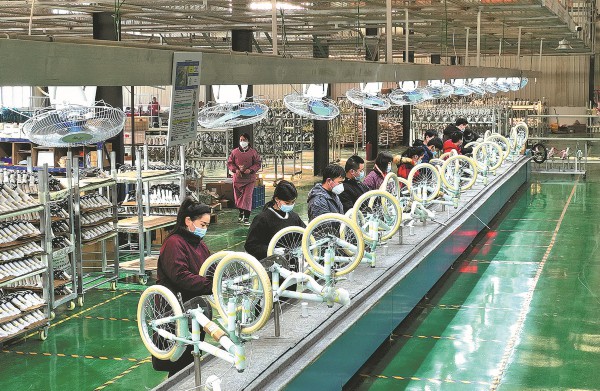
Bicycles for export to Indonesia are assembled at a factory in Shijiazhuang, Hebei province. XINHUA
The China National Offshore Oil Corp, or CNOOC, has bought 65,000 metric tons of natural gas from TotalEnergies, which is based in Paris, through the SHPGX. The LNG was sourced from the UAE.
Guo Xu, the SHPGX chairman, told the media the deal is a meaningful attempt to promote multi-currency pricing, settlement and cross-border payment in international LNG trading.
Analysts said CNOOC's LNG purchase based on the yuan heralds a new trend not only in the oil and gas industry but in global trade and finance.
Some analysts wondered how the US would react to this trend. Decades ago, Iraqi leader Saddam Hussein and his Libyan counterpart Muammar Gaddafi sought alternative use of the US dollar in energy trade, before they were accused of tyranny, toppled and eventually killed.
But times have changed. The sanctions levied against Russia by the US since last year have shown how the greenback is being "weaponized", observers said. The appropriation of Russian tycoons' dollar-denominated assets, deemed to violate the very basis of capitalism, chilled many in business circles.
Even US Treasury Secretary Janet Yellen admitted that US sanctions imposed on Russia and other countries have put the dollar's dominance at risk.
In an interview with CNN on April 16, Yellen said: "There is a risk when we use financial sanctions that are linked to the role of the dollar that over time it could undermine the hegemony of the dollar. Of course, it does create a desire on the part of China, of Russia, of Iran, to find an alternative."
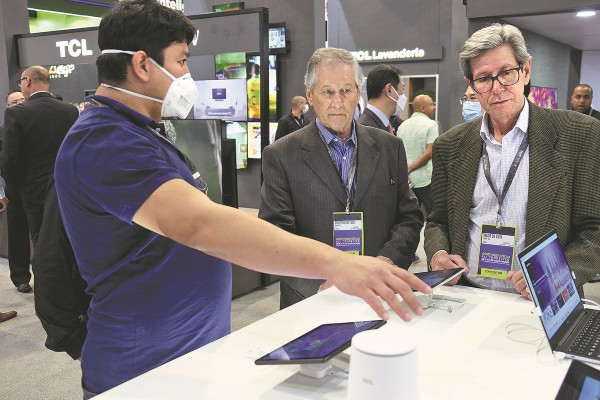
A staff member at Chinese electronics giant TCL introduces products to visitors at an expo in Sao Paolo, Brazil. CHEN HAOQUAN/XINHUA
Key feature
Phua said there is a perception that the dollar is being "weaponized "through US-led sanctions blocking or restricting a country's ability to settle transactions in the greenback.
"One of the key features of a global reserve currency arguably should be its 'neutrality' and not it being used as a tool to advance a particular set of foreign policy objectives. Whether the US dollar satisfies such a standard is a question at least open for debate, and this has been one of the motivators in encouraging a shift to a more diverse set of reserve currencies and/or means for settlement of international commodity transactions," he said.
Deniz Istikbal, an economics researcher at the Foundation for Political, Economic and Social Research, a think tank based in Ankara, Turkiye, said the increased use of the yuan in trade and foreign exchange reserves is closely linked to the growing prominence of China.
In Malaysia, for example, Prime Minister Anwar Ibrahim said the nation is negotiating with China to enable bilateral trade to be settled in the yuan and the Malaysian ringgit. Anwar has also proposed establishing an Asian Monetary Fund.
"There is no reason why countries like Malaysia continue to rely on the dollar," Anwar told the Malaysian parliament on April 4.
In March, China and Brazil agreed to drop the dollar as an intermediary currency, and will instead use the yuan and Brazilian real in bilateral transactions. Brazilian President Luiz Inacio Lula da Silva has likewise urged the BRICS nations (Brazil, Russia, India, China and South Africa) to develop an alternative currency that can replace the dollar in foreign trade.
On April 13, during his visit to the New Development Bank, or NDB, in Shanghai, Lula said: "Why can't an institution like the BRICS bank have a currency to finance trade relations between Brazil and China, between Brazil and all the other BRICS countries? Who decided that the dollar was the (trade) currency after the end of gold parity?"
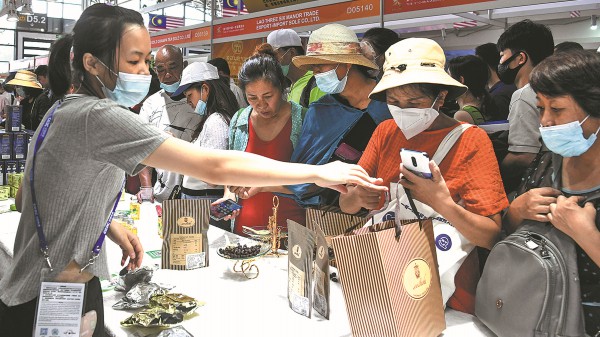
Visitors crowd the China-ASEAN Expo in Nanning, Guangxi Zhuang autonomous region, in September. ZHANG AILIN/XINHUA
The NDB, an institution established by the BRICS countries, is currently headed by Dilma Rousseff, a former president of Brazil.
In February, the Central Bank of Iraq announced that it would allow direct yuan settlement for trade from China. This policy is in line with the bank's plan to improve access to foreign currencies.
The bank is planning to use the yuan to boost the balances that Iraqi banks have with Chinese banks. Another option is to convert dollars in the bank's accounts with JP Morgan and the Development Bank of Singapore to yuan for payment to final beneficiaries in China.
Anis Khayati, assistant professor in economics at the University of Bahrain, said the Iraqi bank's plan is proof of the yuan's growing role in international trade. This is "an unprecedented step (toward) globalization of the yuan against the US dollar and could give China an important role in the global oil market, he added.
In addition to the yuan, other Asian currencies are becoming more "global".
In January, at the World Economic Forum in Davos, Switzerland, Saudi Arabia's Finance Minister Mohammed Al-Jadaan said his country is open to trading in currencies other than the dollar to "improve trade."
"There are no issues with discussing how we settle our trade arrangements, whether it is in the US dollar, whether it is the euro, whether it is the Saudi riyal," Al-Jadaan said in an interview with Bloomberg.

The 3rd China (Indonesia) Trade Expo held in Jakarta, the Indonesian capital, last month draws numerous visitors. XU QIN/XINHUA
Special accounts
On July 31, India's central bank, the Reserve Bank of India, or RBI, set up a mechanism to facilitate cross-border trade transactions in the Indian rupee. India's Minister of State for Finance, Bhagwat Karad, said last month the RBI has approved 60 requests to open special rupee vostro accounts, or SRVAs, for correspondent banks in 18 countries.
Such accounts keep the foreign entity's holdings in the Indian bank, in Indian rupees. When an Indian importer wants to make a payment to a foreign trader in rupees, the amount will be credited to this vostro account.
On March 16, the High Commission of India in Dar es Salaam, Tanzania, announced that the RBI had allowed banks in India to open SRVAs for correspondent banks in Tanzania, allowing the two countries to trade using the Indian rupee and the Tanzanian shilling. A statement issued by the High Commission said this move will enable seamless payment transactions in domestic currencies, help conserve foreign exchange, and boost bilateral trade.
Piyush Goyal, India's commerce and industry minister, said at a briefing on April 13 that several countries are in talks with the RBI to facilitate trade in the rupee to reduce transaction costs, local media reported. Goyal said this is because settlements based on the dollar or the euro involve additional conversion costs.
Bangladesh recently agreed to pay Russia in yuan for a nuclear power plant that Russia's Rosatom State Atomic Energy Corp is helping construct near Dhaka, the Bangladeshi capital.
Russia's top lenders such as Sberbank, VTB Bank and Gazprombank have special rupee vostro accounts, allowing them to transact in Indian rupees.
Members of the Association of Southeast Asian Nations, or ASEAN, are also planning to use local currencies in intra-regional transactions. Perry Warjiyo, governor of the Indonesian central bank, said the regional bloc will create a task force to help ASEAN economies shift to using local currencies, instead of the dollar.
Warjiyo said on March 31 at the end of the ninth ASEAN Finance Ministers and Central Bank Governors Meeting in Bali, Indonesia, that using local currencies for cross-border trade and investment will reinforce financial resilience in the region.
Ernesto Pernia, former Philippine socioeconomic planning secretary, said the proposal to adopt local currencies for intra-regional trade is ideal, but not feasible in the near term. "It will entail much discussion and trial and error over the long run to arrive at a definitive collective agreement," he added.
V. Bruce Tolentino, a private-sector member of the Philippine central bank's monetary board, said in earlier interview with China Daily that ASEAN may be able to use local currencies for cross-border transactions in five to 10 years.
He said it was time to reduce the dominance of the dollar — and that of US banks — in international trade, as the COVID-19 pandemic and the Russia-Ukraine conflict have highlighted the need to build alternative trade finance and payment systems.
Rossi, from the University of Fribourg, said geopolitical tension such as the Russia-Ukraine conflict has pushed countries to "de-dollarize their own economies".
He said the sanctions imposed against Russia by the US and nations in Western Europe have encouraged Russia to use alternative currencies for international trade.
Leonardus Jeghoin Jakarta and Jan Yumulin Hong Kong contributed to this story.
prime@chinadailyapac.com






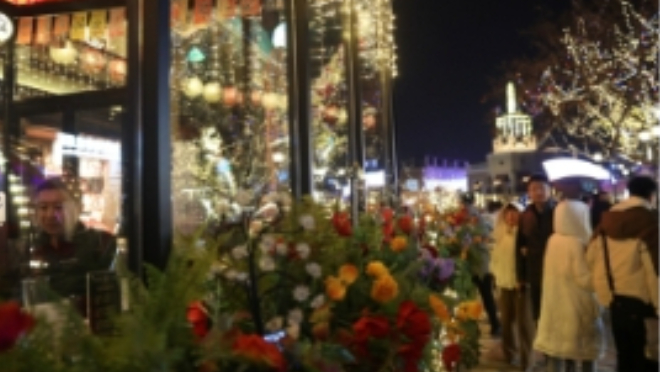

 公安备案号:32010202010067
公安备案号:32010202010067